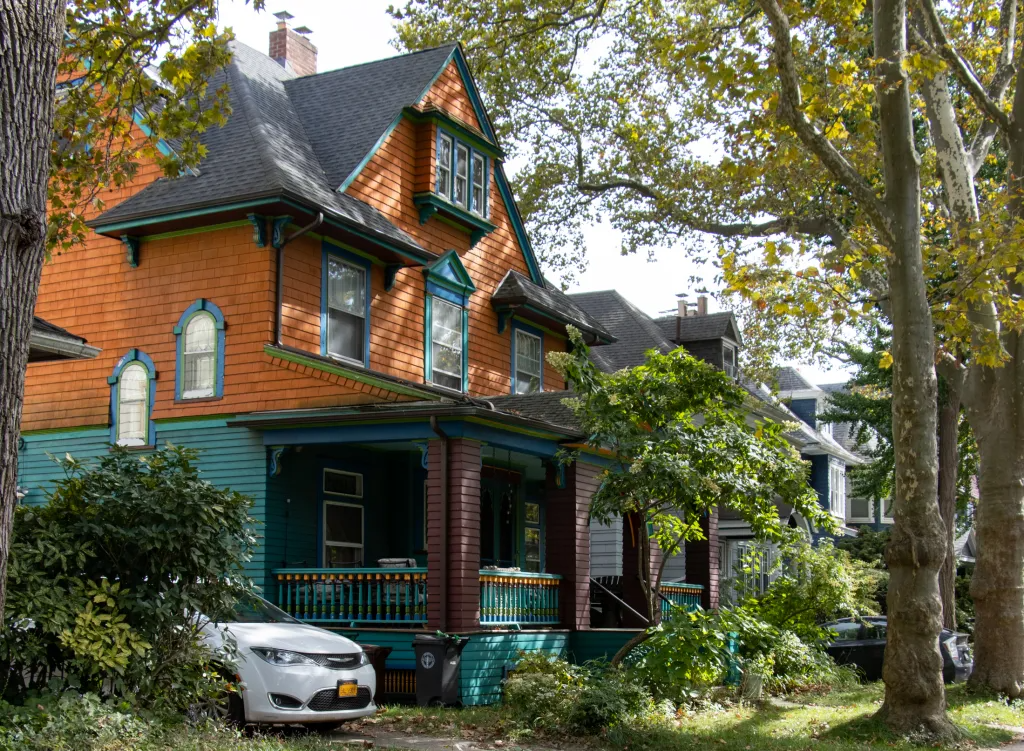Is 4th Avenue Losing Its Lustre?
Is the condo building frenzy on 4th Avenue grinding to a halt? A couple of weeks ago we found out that a would-be developer on 4th Avenue between 8th and 9th streets had decided to sell off his property along with the approved plans for a glassy condo he planned to build. And now we’ve…


Is the condo building frenzy on 4th Avenue grinding to a halt? A couple of weeks ago we found out that a would-be developer on 4th Avenue between 8th and 9th streets had decided to sell off his property along with the approved plans for a glassy condo he planned to build. And now we’ve learned that another development site just a block away is also on the market. Massey Knakal has a listing for 426 4th Avenue that includes plans for the building shown above. The 50-by-60-foot lot (see photo on jump) is going for $3.75 million; according to Property Shark, it sold for $500,000 a few years ago. So what gives? Why are these guys bailing on their projects? Is 4th Avenue looking like a shakier bet than it did a couple of years ago?
4th Avenue Glassy Condo Site Asking Almost $10 Million GMAP P*Shark
4th Avenue Condos: The Next Generation? [Brownstoner]





Sunset Park may be rezoned, but it’s still farther away from Manhattan than Park Slope – not a lot, but enough to make difference to commuters if you have two similarly priced condos available, IMO.
I also don’t think there’s any stopping the surge of 4th Ave. development. The genie is out of the bottle; once Whole Foods and other retail developments I’ve been hearing about come in, there will be even more reason for people to buy in the area.
Just as Michelle Williams is staying in Brooklyn (!), so too is 4th Ave. going to remain a hot commodity for people looking for relatively affordable, fairly quality housing in a great neighborhood that’s only a 40-minute commute from Manhattan.
isn’t the writers guild strike also going to have an impact? they are complaining about their cut, but their current cut is still pretty sweet, no?
First Finance, now the law firms are starting to shed jobs. Hate to say it, but the F’in What is right to a degree. This is not good for the NY Market:
Credit-Crunch Casualties:
Six NY BigLaw Associates Axed
In one of the first clear signs that slumping credit markets are causing economic pain at law firms, Clifford Chance yesterday laid off a group of associates in the structured finance area.
John Christian, the partner in charge of the London-based firm’s U.S. personnel committee, said the firm had made a difficult “business decision” to lay off the six associates in a practice group that worked exclusively for credit rating agency Standard & Poor’s. The lawyers in the group had reviewed the documentation S&P used to rate mortgage-backed securities, the market for which has collapsed in recent months.
“We concluded this work just wasn’t coming back,” Mr. Christian said. He declined to discuss the severance packages offered to the associates, but one of those terminated said they were offered three months’ salary with no bonus. Indeed, the associate said the timing of the layoffs seemed designed to deprive the targeted associates, all of whom were relatively senior, of their bonuses.
The past week has seen a flurry of bonus announcements from New York law firms matching the level set last Monday by Cravath, Swaine & Moore. Cravath announced two bonuses that, combined, range from $45,000 for first-years to $110,000 for senior associates. Among the many firms that have matched that range in recent days are Milbank, Tweed, Hadley & McCloy; Willkie Farr & Gallagher; Simpson Thacher & Bartlett and Sullivan & Cromwell (see “NY Firms March to Match Cravath Bonuses”). Clifford Chance has not yet announced a bonus but in the past has matched other firms.
The high bonuses announced by law firms have stood in contrast to bad news at major clients like investment banks, many of which have already had layoffs.
Many of the layoffs at banks are also linked to the weakness of the structured finance market, and many of the law firms with large practices in the area may feel pressure to make cuts.
Clifford Chance was actually not a major player in the U.S. structured finance market, at least not compared to firms like Cadwalader, Wickersham & Taft; Sidley Austin; Orrick, Herrington & Sutcliffe; McKee Nelson and Thacher Proffitt & Wood, all of whom have scores of lawyers in securitization practices that have slowed considerably.
Paul D. Tvetenstrand, chairman of Thacher Proffitt, said his firm, while definitely slower than before, still had work from securitizations of assets other than residential mortgages. He said there were no economic layoffs in the works and that associates at the firm have been reassured as such.
“Our partners are going to take the hit before we pass it on to the associates,” he said.
McKee Nelson brought aboard another New York partner yesterday. Alice F. Yurke, formerly a partner at Morrison & Foerster, said her derivatives practices could take advantage of some of the skills of the firm’s many structured finance lawyers in an area that was still quite busy.
Mr. Christian said Clifford Chance had decided the associates in its S&P group could not be reassigned because of their relative seniority. The firm has about 260 lawyers in its New York office.
Law firms are generally loath to engage in layoffs because they hurt the firm image in the eyes of both lateral and law-school candidates. Clifford Chance is still wrestling with the fallout from a leaked 2002 associates’ memo that described widespread misery at the firm.
Nevertheless, law firms have engaged in major layoffs in the past. Shearman & Sterling laid off 10 percent of its associates when mergers and acquisitions plummeted in 2001 and the former Dewey Ballantine (now Dewey & LeBoeuf) also had a number of layoffs.
“Is 4th Avenue looking like a shakier bet than it did a couple of years ago?”
No question about it. A glut of condos is hitting the market just as the fallout from the subprime mortgage crisis is both increasing the cost of financing and hitting Wall Street. We saw a similar glut of new construction with subsequent market downturn in the last 80s and early 90s. No need for homeowners to panic if you’re settled in for the long-term, but in the short-term (five years, maybe more), the “lustre” of Fourth Avenue and other areas on the edges of already-gentrified areas of Brooklyn will definitely be tarnished.
Whether 4th Avenue is desirable or not depends on price. Developers overpaid for land expecting to overcharge. Now they are realizing they will have to sell units for less, and are trying to find a greater fool to buy the lots.
Once 4th Avenue in Sunset Park is rezoned, there will be miles of potential competing sites available.
The hype has been absurd, and everyone has hoped to sell “luxury condos” to the same top 3% of the income distribution. In Brooklyn, a “luxury” condo is an apartment with its own toilet.
Damn right a Brooklyn real estate blog should be written in Limey. Especially as up to a third of NYC condo buyers are now of foreign provenance.
but you’re right about the glut on fourth. A huge building at about Butler recently went up, you’ve got the condos behind McDonalds on 1st street getting closer to completion. Might explain why the towers on either side of Carroll are moving slowly (well, that and a stop-work order on one of them)
Gabby must have been eating her tea and crumpets when she wrote this headline: http://dictionary.reference.com/browse/lustre
4th Ave has lustre? Luster?
the first thing we do when we buy a property is to put it up for sale -especially if we got the approvals fora building. If we can get 50% of our profits 2 years early without going through the nightmares and delays of building we are happy and then move on to the next one.